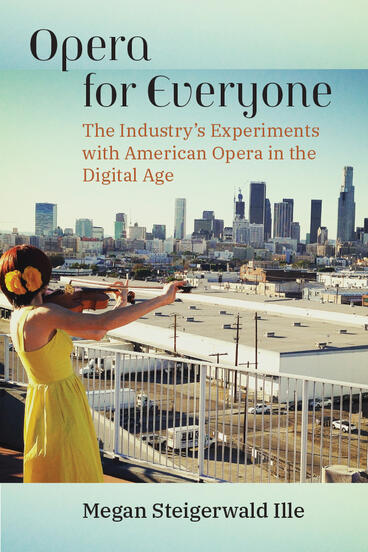Opera for Everyone
The Industry's Experiments with American Opera in the Digital Age
How one opera company represents the economic precarity and aesthetic possibilities of operatic performance in the twenty-first century U.S.
Description
Opera for Everyone: The Industry’s Experiments with American Opera in the Digital Age draws on seven years of multi-sited ethnography to examine the acclaimed experimental productions of Los Angeles-based opera company The Industry. Steigerwald Ille understands The Industry’s productions as part of an emerging wave of U.S. operas that integrate new media and interactive performance through means such as site-specificity and simulcast video, and then traces the company’s path from Crescent City (2012), the company’s first production, to Sweet Land (2020), the company’s final production before switching to a new production model. Steigerwald Ille argues that by moving opera outside of the opera house, The Industry’s productions expose the economic and aesthetic structures key to the circulation of operatic performance at the same time that they deploy opera as a tool for digital listening, community engagement, popular entertainment, and commentary on systemic racism and settler colonialism. Through ethnographic work with The Industry’s creators and performers, and close examination of the company’s first decade of work, this book reveals how The Industry paradoxically provides both a roadmap and boundary line for experimental and traditional companies trying to find new ways to approach operatic performance in the twenty-first century United States.
Megan Steigerwald Ille is Assistant Professor of Musicology at the College-Conservatory of Music at the University of Cincinnati.
Reviews
“Opera for Everyone is a substantive, enlightening, and important work of scholarship that lays the groundwork for further research in the lively field of opera studies. In her examination of The Industry, Steigerwald Ille draws on a multiplicity of voices—a strategy that complements the multivalent complexity of opera—and her sincere, thoughtful engagement with the ethics of contemporary opera production offers an excellent model for the study of performing arts in the twenty-first century.”
- Ryan Ebright
—Ryan Ebright, Bowling Green State University
“Compared to how abundantly pieces of contemporary musical theatre and opera are present on all kinds of scenes, the literature about this field is still meager. Opera For Everyone is extremely welcome as it illuminates the world and poetics of contemporary opera and it turns this interest into a dynamic book.”
- Jelena Novak
—Jelena Novak, CESEM (Center for Study of the Sociology and Aesthetics of Music), FCSH, Universidade NOVA de Lisboa

